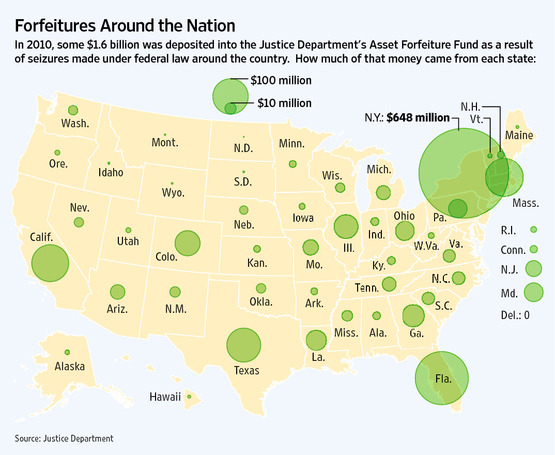
The Drug Enforcement Administration takes billions of dollars in cash from people who are never charged with criminal activity, according to a report issued today by the Justice Department’s Inspector General.

Since 2007, the report found, the DEA has seized more than $4 billion in cash from people suspected of involvement with the drug trade. But 81 percent of those seizures, totaling $3.2 billion, were conducted administratively, meaning no civil or criminal charges were brought against the owners of the cash and no judicial review of the seizures ever occurred.

That total does not include the dollar value of other seized assets, like cars, homes, electronics and clothing.
These seizures are all legal under the controversial practice of civil asset forfeiture, which allows authorities to take cash, contraband and property from people suspected of crime. But the practice does not require authorities to obtain a criminal conviction, and it allows departments to keep seized cash and property for themselves unless individuals successfully challenge the forfeiture in court. Critics across the political spectrum say this creates a perverse profit motive, incentivizing police to seize goods not for the purpose of fighting crime, but for padding department budgets.

In the absence of this information, the report examined 100 DEA cash seizures that occurred “without a court-issued warrant and without the presence of narcotics, the latter of which would provide strong evidence of related criminal behavior.”

Fewer than half of those seizures were related to a new or ongoing criminal investigation, or led to an arrest or prosecution, the Inspector General found.
“When seizure and administrative forfeitures do not ultimately advance an investigation or prosecution,” the report concludes, “law enforcement creates the appearance, and risks the reality, that it is more interested in seizing and forfeiting cash than advancing an investigation or prosecution.”

The scope of asset forfeiture is staggering. Since 2007 the Department of Justice’s Asset Forfeiture Fund, which collects proceeds from seized cash and other property, has ballooned to $28 billion. In 2014 alone authorities seized $5 billion in cash and property from people — greater than the value of all documented losses to burglary that year.
Some of the encounters were based on tips from confidential sources working in the travel industry, a number of whom have received large sums of money in exchange for their cooperation. In one case, officers targeted an individual for questioning on a tip from a travel industry informant that the individual had paid for a plane ticket with a pre-paid debit card and cash.
